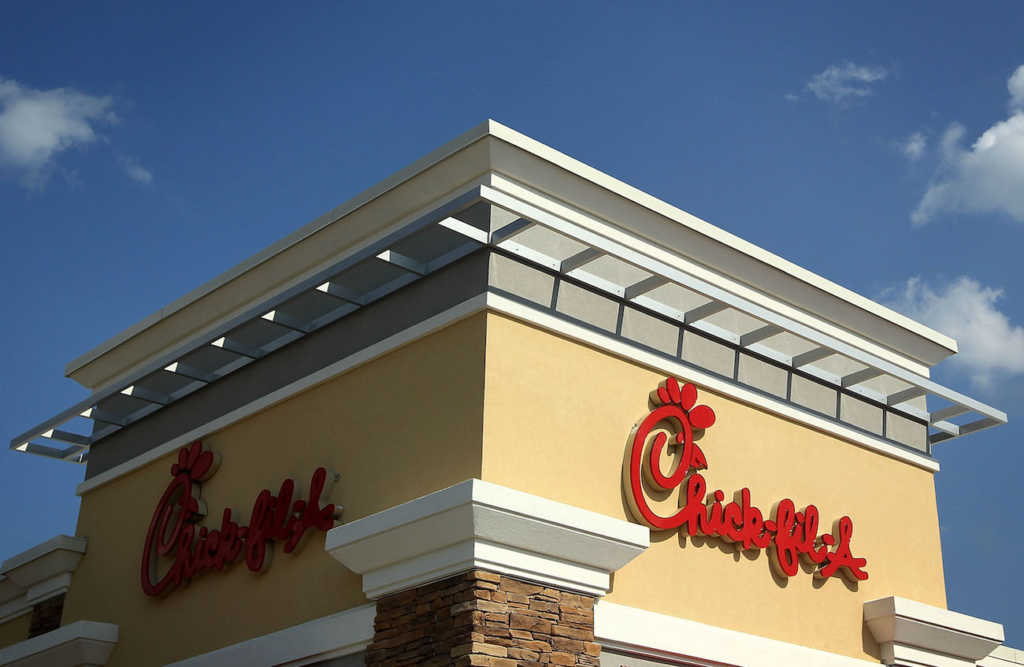The student government at a private liberal arts college in Texas has voted to ban Chick-fil-A from their campus. Trinity University, who is affiliated with the Presbyterian Church, does not have a Chick-fil-A on their campus, but serve its food on a rotating basis in the cafeteria.
The unanimous vote resulted in a new resolution being added, pressuring leadership to follow through with the ban. The resolution was adopted on May 1, with the student government outlining Chick-fil-A’s donations to groups that failed to support LGBTQ+ rights.
“Trinity’s values of diversity and inclusion and Chick-fil-a’s values regarding the LGBT+ community are mutually exclusive,” the resolution read.
They also cited the fast food chains score on the Human Rights Campaign’s 2015 Corporate Equality Index, which is zero, for “failing to protect their LGBT+ employees from discrimination in the workplace.”
“Chick-fil-a donated 1.8 million dollars to anti-LGBT+ organizations in 2017, such as the Paul Anderson Youth Home, the Salvation Army, and the Fellowship of Christian Athletes, according to their most recent available tax return,” the resolution cited.
“Underrepresented students from the LGBT+ community have expressed the drastic assault on their identities and beings as a result of Chick-fil-A’s ideals and actions, and SGA stands to represent all students regardless of the size of the community,” the resolution continued. “Trinity is a university that emphasizes its commitment to diversity and inclusion. Having Chick-fil-a in the rotation at Revolve conflicts with those values.”
Ty Tinker, student government president, said that they decided to go after the fast food issue after “a lot of proactive folks, including PRIDE (Trinity’s student LGBT group), came to student government and university administrators.”
“The sentiment displayed at the ‘Speaking of Chick-Fil-A’ forum demonstrated that students disapprove of having Chick-fil-a on campus in Revolve, and would advocate for a comparable substitute that doesn’t conflict with Trinity’s values. The negative consequences of having Chick-fil-A on campus outweigh the desires of those who are in favor of keeping it on campus,” it continued.
Student government resolutions are non-binding, so they don’t actually create or change campus laws, but they push administrators to move in that direction.
Recently, the San Antonio city council voted in a 6-4 ruling to take Chick-fil-A out of their airport, which only fueled the student bodies desire to ban it from their cafeteria as well.
This isn’t the first time that Trinity students have gone after the issue of Chick-fil-A being on campus. In the middle of April, the Trinitonian and the dean of students office held an event dedicated to talking about Chick-fil-A.
“It’s our tradition and responsibility to foster open, free dialogue about issues of importance to our students,” Tess Coody-Anders, Vice President for Strategic Communications, said in a statement. “We’re proud of our students’ willingness to engage in difficult conversations and to amplify the voices of those who are often underrepresented and overlooked.”
The reactions
Not all students agree with removing Chick-fil-A from their campus. Isaiah Mitchell, the president of the Young Conservatives of Texas chapter at Trinity, argued that Chick-fil-A does nothing to harm the LGBT community.
Mitchell, along with other university students held an off-campus event at Chick-fil-A to protest the resolution made by their student government.
Mitchell pointed out that the group “would like to see Chick-fil-A back in the airport, as a symbolic presence and a reaffirmation of the First Amendment,” Mitchell said.
Mitchell also pointed out that because Trinity is a private institution, unlike the airport, “if they decide to remove Chick-fil-A, that’s well within their rights.”
Mitchell also refuted the student body governments claim that Chick-fil-A is harmful towards the LGBT community.
“The Salvation Army, Fellowship of Christian Athletes, these other organizations that Chick-fil-A supports, do not actually cause harm to the LGBT community,” he stated.
Mitchell also added that lobbying “against the political goals of the LGBTQ left” is not the same as “actually harming.”
Chick-fil-A was only added to the food court rotation less than a year ago when Aramark, Trinity’s food service vendor, added them in.
Aramark “is taking the recommendation into consideration as part of a normal process this summer in which revolving food service vendors are evaluated for the next school year,” Coody-Anders said.



